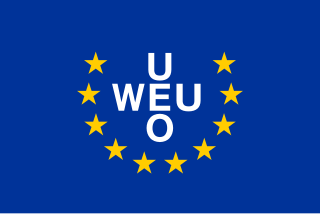
The Western European Union was the international organisation and military alliance that succeeded the Western Union (WU) after the 1954 amendment of the 1948 Treaty of Brussels. The WEU implemented the Modified Brussels Treaty. During the Cold War, the Western Bloc included the WEU member-states, plus the United States and Canada, as part of the North Atlantic Treaty Organization (NATO).

Francisco Javier Solana de Madariaga CYC is a Spanish physicist and PSOE politician. After serving in the Spanish government as Foreign Affairs Minister under Felipe González (1992–1995) and as the Secretary General of NATO (1995–1999), leading the alliance during Operation Allied Force, he was appointed the European Union's High Representative for Common Foreign and Security Policy, Secretary General of the Council of the European Union and Secretary-General of the Western European Union and held these posts from October 1999 until December 2009.

The High Representative of the Union for Foreign Affairs and Security Policy/Vice-President of the European Commission (HR/VP) is the chief co-ordinator and representative of the Common Foreign and Security Policy (CFSP) within the European Union (EU). The position is currently held by Kaja Kallas.

The Common Security and Defence Policy (CSDP) is the European Union's (EU) course of action in the fields of defence and crisis management, and a main component of the EU's Common Foreign and Security Policy (CFSP).
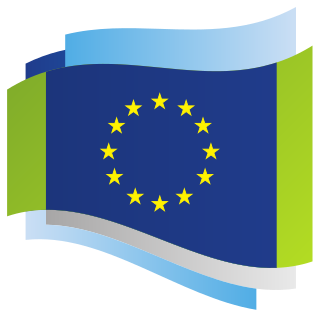
The European Defence Agency (EDA) is an agency of the European Union (EU) that promotes and facilitates integration between member states within the EU's Common Security and Defence Policy (CSDP). The EDA is headed by the EU High Representative for Foreign Affairs and Security Policy, European Commission’s Vice President (HR/VP), and reports to the Council. The EDA was established on 12 July 2004 and is based in Brussels, Belgium, along with a number of other CSDP bodies.

The European Rapid Operational Force (EUROFOR) was a multinational rapid reaction force composed of forces from four states of the European Union: Italy, France, Portugal and Spain. It had a permanent staff capable of commanding operations, involving commitments of up to a Light Division in size. Eurofor was formed in May 1995 in Lisbon, and was answerable to the Western European Union (WEU) directly. It was tasked with performing Petersberg tasks, including humanitarian, peacekeeping and peace enforcement missions. With the merger of several WEU elements into the European Union, Eurofor had by and large become part of the Common Security and Defence Policy. It was eventually transformed into an EU Battlegroup and was on standby from 1 July until 31 December 2011. On 2 July 2012, Eurofor was dissolved.
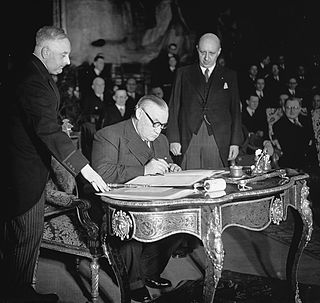
The Treaty of Brussels, also referred to as the Brussels Pact, was the founding treaty of the Western Union (WU) between 1948 and 1954, when it was amended as the Modified Brussels Treaty (MTB) and served as the founding treaty of the Western European Union (WEU) until its termination in 2010. The treaty provided for the organisation of military, economic, social and cultural cooperation among member states as well as a mutual defence clause.

Miroslav Lajčák is a Slovak politician and diplomat, former Minister of Foreign Affairs of the Slovak Republic. In addition, Lajčák also served as President of the United Nations General Assembly for the 72nd session from 2017 until 2018.
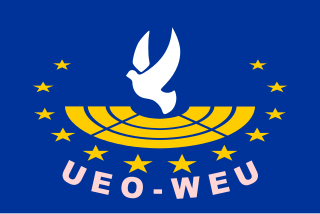
The Assembly of the Western European Union, also called the European Security and Defence Assembly, was a parliamentary assembly for delegations from the national parliaments of the member countries of the Western European Union (WEU), a security and defence organisation. Its final session was on 10 May 2011.

The flag of the Western European Union (WEU) was dark blue with a semicircle of ten yellow five pointed stars, broken at the top, with the organisation's initials in the centre. Although it is the flag of a military organisation, it has rarely been flown in military situations.
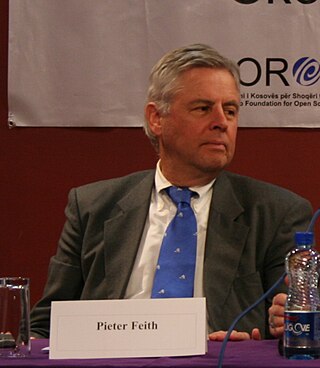
Pieter Cornelis Feith is a Dutch diplomat, formerly serving as the European Union Special Representative (EUSR) and as the International Civilian Representative in Kosovo.

The secretary-general of the Council of the European Union heads the General Secretariat of the Council of the European Union. In October 2022, the Council appointed Thérèse Blanchet as the Secretary-General of the Council for a five-year term, from 1 November 2022 to 31 October 2027.
The EU Intelligence and Situation Centre is a "civilian intelligence function" of the European Union (EU). Structurally, it is a directorate of the External Action Service (EEAS) and reports directly to the EU's High Representative for Foreign Affairs and Security Policy. Article 4 of the Treaty on European Union, among other things, expressly states that "national security remains the sole responsibility of each Member State". EU INTCEN's analytical products are based on intelligence from the EU Member States' intelligence and security services.

The Western Union (WU), also referred to as the Brussels Treaty Organisation (BTO), was the European military alliance established between France, the United Kingdom (UK) and the three Benelux countries in September 1948 in order to implement the Treaty of Brussels signed in March the same year. Under this treaty the signatories, referred to as the five powers, agreed to collaborate in the defence field as well as in the political, economic and cultural fields.
Arnaud Marie Pierre André Jacomet was a French historian and the final Secretary-General of the Western European Union (WEU).

The Western European Union Mission Service Medal, is an international military decoration awarded to individuals, who served with Western European Union (WEU) military missions.
José Cutileiro was a Portuguese diplomat and writer. He was a representative to the Council of Europe, Secretary General of the Western European Union (WEU), and an envoy to the UN Commissioner for Human Rights in Bosnia-Herzegovina and Serbia. He was on the faculty of the Institute for Advanced Study in Princeton, New Jersey.

This article outlines the history of the Common Security and Defence Policy (CSDP) of the European Union (EU), a part of the Common Foreign and Security Policy (CFSP).
The Rome Declaration was the document signed at an extraordinary session held by the Council of Ministers of the Western European Union (WEU) in Rome on 26 and 27 October 1984 to mark the 30th anniversary of the Modified Brussels Treaty (MTB). The declaration decided to make better use of WEU to increase cooperation between the member states in the field of security policy, and reactivated the WEU.













